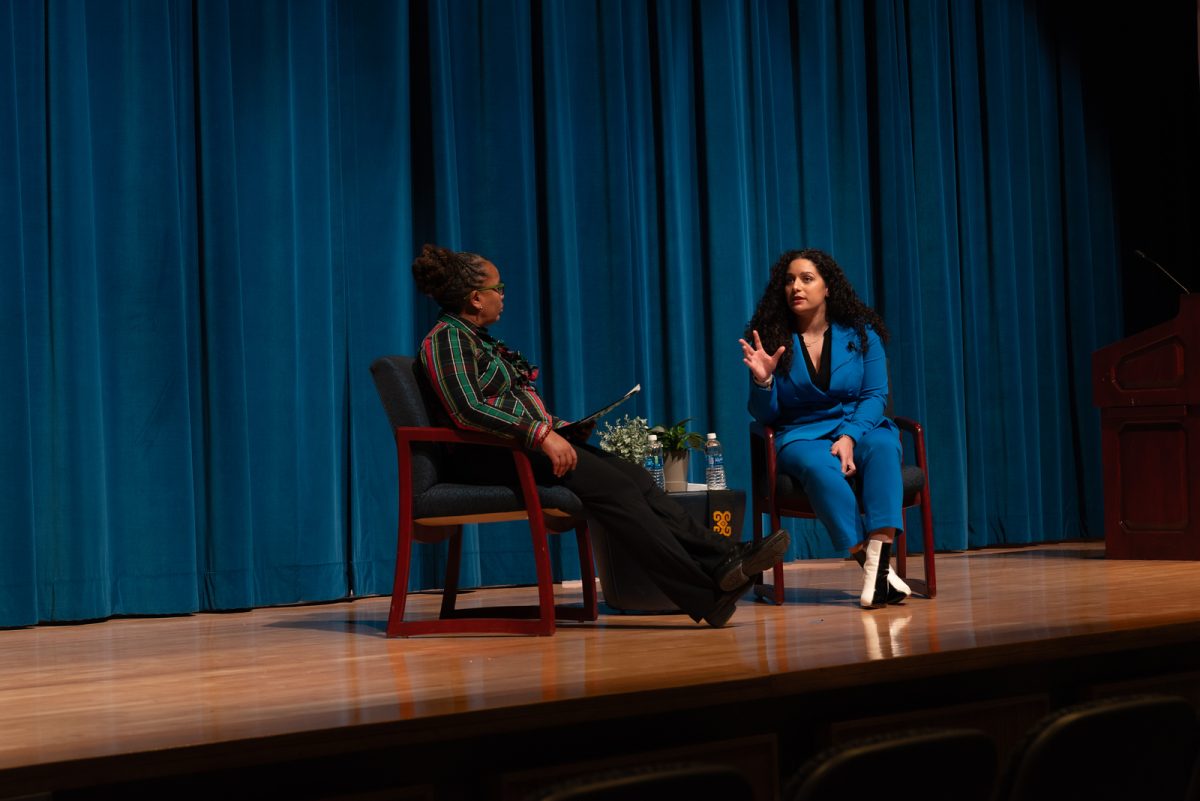Black excellence, success and identity was at the forefront of discussion between university community members and Victoria Alexander, a public speaker and Ph.D. student at the University of Maryland, Monday night in the Kiva.
Ilianna Velez, the primary event facilitator, said students’ opinions were considered when choosing Alexander to speak. With this in mind, she said she was excited to see how Alexander would discuss Black excellence and its relation to students.
“I’m curious to know how [Alexander] would define [Black excellence],” Velez said. “Also, how she would kind of give examples to what she means by [Black excellence] in ways that the students can maybe resonate with.”
The E. Timothy Moore Student Multicultural Center and the Center of Student Involvement organized the event and the VIP luncheon before the event, which allowed for about 20 students to speak to Alexander personally, Michael Daniels, director of the Student Multicultural Center, said.
At the welcome address, Daniels introduced both Alexander and Charmaine Crawford, an associate professor of Africana Studies and moderator of the discussion.
After the introduction, Crawford started the discussion by explaining why she participated in the discussion as she said it is important to discuss Black youth.
“I think some of the work that [Alexander] is doing really kind of connects the type of work and contributions Black youth can make in their communities,” Crawford said.
The university’s theme for Black History Month this year was Black excellence, which led Crawford to ask Alexander what she thought of when she heard the phrase.
Alexander said she often thinks of her family as she viewed the phrase as celebrating individuals’ success.
“For them to be able to model what they have accomplished to me is Black excellence,” Alexander said. “Them being pioneers in their spaces has been really inspirational to me.”
Crawford said she agreed with Alexander remarks as it is important to not only examine Black excellence in different spaces rather than only the Academy Awards.
Later on during the conversation, Crawford asked Alexander if she would want to change the wording of the phrase Black excellence, and Alexander said the wording is not the problem of the phrase but rather the meaning it can have.
“I think though that what it means to be excellent has contemporarily taken on the form of how much money can you acquire, how much fame can you acquire, how much clout can you have,” she said.
Alexander said she hopes Black excellence will include objectives not aligned with capitalism and exploitation but rather to change the phrase to Black agency or Black liberation.
“Where we can exist in a space where mediocrity is just fine,” she said. “There’s nothing wrong with being mediocre, it’s average, that’s fine, that’s great.”
As a response to such a point, during the question and answer part of the event, A’kyra Holley, a junior peace and conflict studies major, asked how to focus less on Black excellence and more on just being.
Alexander said it is important to recognize how individuals may put on a front to make themselves seem more excellent. She said how these behaviors can include boosting about concepts or achievements she is proud of such as her education.
“I try to locate where those behaviors are in me so I can stop doing them,” she said. “I will also sometimes push back on people when I feel like the questions they are asking are a measure of what they understand are valuable.”
Before discussing further topics, Crawford asked what led Alexander to pursuing her current studies and Alexander said the area she grew up in caused her to wonder about inequality. This occurred to her when she was one of the only two Black students in honors classes during middle school and high school.
“The only two Black kids in honors class and it would stay that way until we graduate,” she said. “That made me think about how it can’t just be that I worked really hard, cause I was really smart. Some of that had to do with inequality.”
Alexander said during the Black Lives Matter movement, which was also during her undergraduate studies, she chose to switch her major to focus further on race’s place in media.
“I switched [my major] to how people come to make presumptions about Black communities using traditional media,” she said.
Another topic discussed was how individuals can purchase more items from Black-owned businesses. When asked about her favorite Black-owned businesses, Alexander said they included Brandon Blackwood, CISE and Alaffia.
Also, she said how she made more of an effort in recent years to work with Black-owned businesses to boost their popularity for work.
“Especially, if I think about working with a real estate agent to buy a house one day or plan a wedding or any number of things,” Alexander said. “My conscience towards that intentional decision has been really helpful.”
Crawford said these efforts Alexander intentionally made remind her of an old phrase.
“I think back to when I was growing up and there’s the mantra, ‘for us by us,’ and I think we have to recirculate around that,” she said. “In terms of knowing some of the products and the areas we can access them so further to support Black-owned businesses.”
Alexander said more resources of the topics discussed at the event can be found on her website, Anti-Racist Guide, and her social media accounts.
“People can learn more from [Anti-Racist Guide] and I talk about these things on social media, TikTok, Instagram, and my handle is Victoria_PhD,” she said.
Adriana Gasiewski is a beat reporter. Contact her at [email protected].



